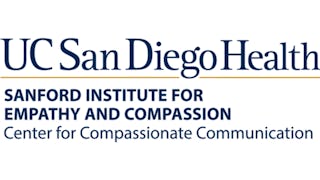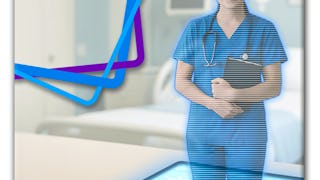This course explores effective communication strategies for healthcare professionals to enhance teamwork and patient care. Learners will reflect upon giving and receiving feedback, managing emotions, addressing microaggressions, and handling conflict in the workplace. Through real-world scenarios, nurses learn to build trust, foster collaboration, and communicate with empathy across interdisciplinary teams.



Communication in Healthcare
This course is part of Nursing Leadership Specialization

Instructor: Amber Vanderburg
Access provided by Orascom Construction
Recommended experience
What you'll learn
Demonstrate effective communication techniques in healthcare settings.
Describe strategies for giving and receiving constructive feedback.
Manage difficult conversations and workplace conflict with professionalism.
Promote collaboration and empathy within the interdisciplinary healthcare team.
Skills you'll gain
Details to know

Add to your LinkedIn profile
6 assignments
October 2025
See how employees at top companies are mastering in-demand skills

Build your subject-matter expertise
- Learn new concepts from industry experts
- Gain a foundational understanding of a subject or tool
- Develop job-relevant skills with hands-on projects
- Earn a shareable career certificate

There are 2 modules in this course
This module introduces students to essential communication principles that support effective healthcare interactions and professional relationships. Students will explore the critical role of communication in healthcare settings, learning to clarify expectations, recognize common cognitive biases like the fundamental attribution error, and engage in proactive conversations that prevent misunderstandings. The module emphasizes the purpose and delivery of constructive feedback, including strategies for navigating emotionally charged situations and managing heated emotions professionally. Students will examine practical frameworks such as the Greaser Approach for difficult conversations, understand the importance of relational feedback in building trust, and learn about the Love Letter Effect in written communication. Through this introduction, learners will develop core communication competencies necessary to foster collaborative relationships, address conflicts constructively, and maintain professionalism in diverse healthcare scenarios.
What's included
10 videos2 readings3 assignments
This module prepares students to navigate complex and difficult communication scenarios commonly encountered in healthcare environments. Students will explore how to recognize and address microaggressions in the workplace, manage conflicts with supervisors professionally, and implement strategies to minimize bullying behaviors. The module emphasizes practical approaches for situations when feedback doesn't produce desired results, how to ask for help and feedback effectively, and the importance of active listening in professional interactions. Students will learn techniques for receiving feedback constructively, communicating effectively during interdisciplinary exchanges, and maintaining professionalism under challenging circumstances. Through this comprehensive exploration, learners will develop the resilience and communication skills necessary to handle sensitive situations, advocate for themselves and others, and contribute to a respectful and collaborative healthcare culture.
What's included
10 videos2 readings3 assignments
Earn a career certificate
Add this credential to your LinkedIn profile, resume, or CV. Share it on social media and in your performance review.
Instructor

Offered by
Why people choose Coursera for their career




Explore more from Health

University of California San Diego




